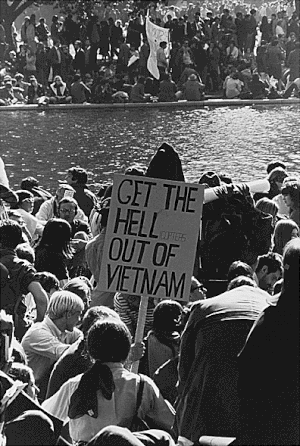Opposition to United States involvement in the Vietnam War
| Opposition to United States involvement in the Vietnam War | |
|---|---|
| Part of the Anti-war movement | |

Protests against the Vietnam War in Washington, D.C., on October 21, 1967
|
|
| Date | 1964–1973 |
| Causes | United States Involvement in the Vietnam War |
| Goals | End the U.S. presence in the Vietnam War |
| Result |
|
The movement against the involvement of the United States in the Vietnam War began in the U.S. with demonstrations in 1964 and grew in strength in later years. The U.S. became polarized between those who advocated continued involvement in Vietnam and those who wanted peace.
Many in the peace movement were students, mothers, or anti-establishment hippies. Opposition grew with participation by the African-American civil rights, women's liberation, and Chicago movements, and sectors of organized labor. Additional involvement came from many other groups, including educators, clergy, academics, journalists, lawyers, physicians (such as Benjamin Spock), Civil Rights Movement leaders and military veterans. Opposition consisted mainly of peaceful, nonviolent events; few events were deliberately provocative and violent. In some cases, police used violent tactics against demonstrators. By 1967, according to Gallup Polls, an increasing majority of Americans considered US military involvement in Vietnam to be a mistake, echoed decades later by the then head of American war planning, former U.S. Secretary of Defense Robert McNamara.
The reasons behind American opposition to the Vietnam War fell into several main categories: opposition to the draft; moral, legal, and pragmatic arguments against U.S. intervention; and reaction to the media portrayal of the devastation in Southeast Asia.
The draft, as a system of conscription which threatened lower class registrants and middle class registrants alike, drove much of the protest after 1965. Conscientious objectors did play an active role although their numbers were small. The prevailing sentiment that the draft was unfairly administered inflamed blue-collar American and especially African-American opposition to the military draft itself.
...
Wikipedia
